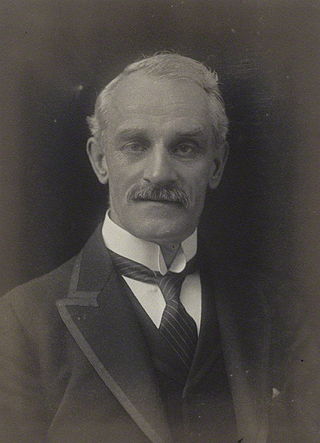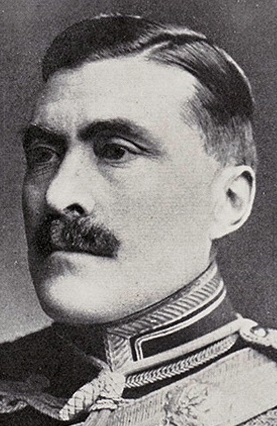Related Research Articles

The 1922 United Kingdom general election was held on Wednesday 15 November 1922. It was won by the Conservative Party, led by Bonar Law, which gained an overall majority over the Labour Party, led by J. R. Clynes, and a divided Liberal Party.

The 1918 United Kingdom general election was called immediately after the Armistice with Germany which ended the First World War, and was held on Saturday, 14 December 1918. The governing coalition, under Prime Minister David Lloyd George, sent letters of endorsement to candidates who supported the coalition government. These were nicknamed "Coalition Coupons", and led to the election being known as the "coupon election". The result was a massive landslide in favour of the coalition, comprising primarily the Conservatives and Coalition Liberals, with massive losses for Liberals who were not endorsed. Nearly all the Liberal MPs without coupons were defeated, including party leader H. H. Asquith.

Gwilym Lloyd George, 1st Viscount Tenby, was a Welsh politician and cabinet minister. The younger son of David Lloyd George, he served as Home Secretary from 1954 to 1957.
The 1922 Newport by-election was by-election held in the parliamentary constituency of Newport on 18 October 1922. The by-election attracted especial attention, both at the time and since, as it was seen as a crucial electoral test of the viability of the Lloyd George Coalition Government, formed of followers of David Lloyd George with the Conservative Party, the latter of which contained an increasing number of members who wished to leave the coalition and regain the party's independence.
Westminster Abbey was a constituency in the Parliament of the United Kingdom. It returned one Member of Parliament (MP) to the House of Commons by the first past the post system of election.

The 1920 Stockport by-election was a parliamentary by-election held on 27 March 1920 for the constituency of Stockport, in Cheshire.

The 1921 Westminster Abbey by-election was a parliamentary by-election held on 25 August 1921 for the British House of Commons constituency of Westminster Abbey in London. The seat had become vacant when the Conservative Member of Parliament (MP) William Burdett-Coutts had died on 28 July 1921. Burdett-Coutts had held the seat since it had been created for the 1918 general election, when he had been returned unopposed.

The 1924 Westminster Abbey by-election was a parliamentary by-election held on 19 March 1924 for the British House of Commons constituency of Westminster Abbey in London. It was notable for the challenge of Winston Churchill to the party system.
The 1943 University of Wales by-election was a parliamentary by-election held in the United Kingdom between 25 and 29 January 1943 for the House of Commons constituency of University of Wales.
The Coalition Coupon was a letter sent to parliamentary candidates at the 1918 United Kingdom general election, endorsing them as official representatives of the Coalition Government. The 1918 election took place in the heady atmosphere of victory in the First World War and the desire for revenge against Germany and its allies. Receiving the coupon was interpreted by the electorate as a sign of patriotism that helped candidates gain election, while those who did not receive it had a more difficult time as they were sometimes seen as anti-war or pacifist. The letters were all dated 20 November 1918 and were signed by Prime Minister David Lloyd George for the Coalition Liberals and Bonar Law, the leader of the Conservative Party. As a result, the 1918 general election has become known as "the coupon election".

The 1922 Bodmin by-election was a parliamentary by-election for the British House of Commons. The constituency of Bodmin in Cornwall polled on 23 February 1922. The by-election was notable for the opposition Liberal Party gaining a seat from the Coalition-supporting Conservative Party.
Frederick Joseph Laverack was an English social worker, campaigner for the blind and Liberal Member of Parliament. He contested Brixton in London on four occasions in the 1920s, winning on one occasion.
The 1921 Cardiganshire by-election was a parliamentary by-election held for the British House of Commons constituency of Cardiganshire on 18 February 1921. The election was important for the bitterness of the contest between the Coalition and Independent factions within the Liberal Party and the deepening of this division within the party as a factor in the long-term decline of Liberalism in Wales.
The Northampton by-election was a parliamentary by-election held for the British House of Commons constituency of Northampton on 1 April 1920.

Sir Joseph Davies was a Welsh businessman, commercial statistician and Liberal Party politician. He was one of a talented group of men and women who worked closely with David Lloyd George during his premiership as a key member of Lloyd George's wartime secretariat, known as the Garden Suburb.

Lieutenant-Colonel Reginald Vincent Kempenfelt Applin, DSO, OBE was a British military officer who took a prominent part in the development of machine gun tactics in the British Army. He later entered politics, initially in two minor right wing parties before becoming a Conservative Party Member of Parliament.
The National Liberal Party was a liberal political party in the United Kingdom from 1922–23. It was created as a formal party organisation for those Liberals, led by Prime Minister David Lloyd George, who supported the Coalition Government (1918–22) and subsequently a revival of the Coalition, after it ceased holding office. It was officially a breakaway from the Liberal Party. The National Liberals ceased to exist in 1923 when Lloyd George agreed to a merger with the Liberal Party.
Sir James Malcolm Monteith Erskine, sometimes referred to as J. M. M. Erskine, was a British politician. First elected at a Westminster St George's by-election in 1921 as an Anti-Waste League candidate, then returned a second time as an Independent Conservative, Erskine went on to be returned twice more as an unopposed official Conservative.
The 1919 Isle of Thanet by-election was a parliamentary by-election for the British House of Commons constituency of Isle of Thanet on 15 November 1919.
References
- 1 2 3 4 5 6 D. Boothroyd, The History of British Political Parties, Politico's Publishing: 2001, p. 15
- 1 2 Martin Pugh, Hurrah for the Blackshirts: Fascists and Fascism in Britain Between the Wars, Pimlico 2006, p. 76
- ↑ Morgan, Kenneth O. (1979). "10: Major Challengers: the Die-Hards". Consensus and Disunity: The Lloyd George Coalition Government 1918-1922. Oxford: Clarendon Press. p. 245. ISBN 0198224974.